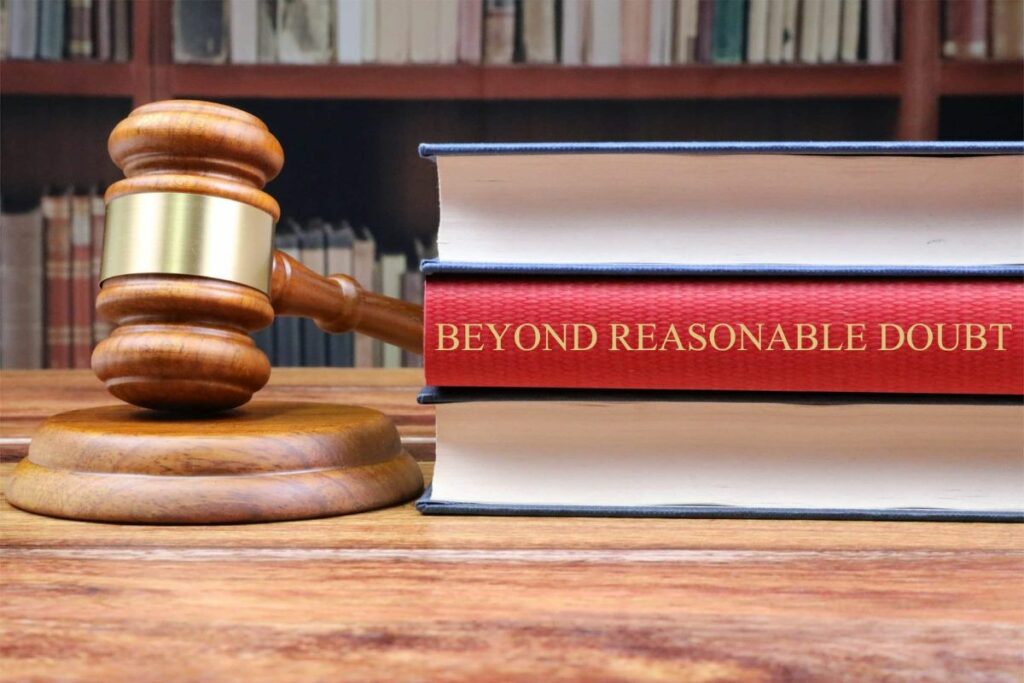Whilst the term ‘presumption of innocence’ and ‘beyond a reasonable doubt’ may be lines many of us have seen on our TV screens or read in newspaper articles, many may still question what does beyond a reasonable doubt mean within the criminal justice system. The standard of proof of ‘beyond reasonable doubt’ refers to the extent to which a case must be proven for an individual to be found guilty of an offence. It is important for anyone convicted of a criminal offence to understand this standard of proof, so they are aware of their rights as an accused person.

What is a standard of proof?
The standard of proof is the level of certainty and the degree of evidence necessary to establish proof in a criminal or civil proceeding. In civil proceedings, the standard of proof is “on the balance of probabilities, ” meaning the case has been established by more than 50%.
In Criminal cases in NSW, the highest standard of proof applies and that is beyond a reasonable doubt. As prescribed in common law by Justice Newman in the case R v. GWB (2000), it is stated, “judges should not depart from the time-honoured formula that the words ‘beyond reasonable doubt’ are words in the ordinary English usage and mean exactly what they say”. In other words, in order for an individual to be found guilty in a criminal proceeding in NSW, there must be no reasonable possibility that the accused did not commit what they have been charged with.
The presumption of innocence
The foundation of our criminal legal system is based on the presumption of innocence. This essentially means anyone accused of a criminal offence is to be deemed innocent until that individual is found guilty or pleaded guilty in a court of law. The presumption of innocence is a globally accepted human right, enshrined in the International Covenant on Civil and Political Rights.
As such, the burden of proof beyond a reasonable doubt in NSW aligns with the fundamental principles of the presumption of innocence. It ensures any person cannot be found guilty unless there is no reasonable alternative hypothesis consistent with their innocence.
Legislation
The criminal standard of proof is set out in section 141 of the Evidence Act, which states:
(1) In a criminal proceeding, the court is not to find the case of the prosecution proved unless it is satisfied that it is proven or has been proved beyond a reasonable doubt.
(2) In a civil proceeding, the court is to find a defendant’s case proved if it is satisfied that the criminal case against has been proved on the balance of probabilities.
Who must prove if the accused is guilty beyond a reasonable doubt?
The Onus of proof in NSW in a criminal trial is the burden or obligation of proof of the guilt of the accused and is placed squarely on the Crown. This means the prosecution must prove the accused guilty beyond a reasonable doubt for an individual to be found guilty.
As such, in criminal proceedings, there is no obligation of the accused to present a defence to the charges brought against them as it is the role of the prosecution to present the guilt of the accused, excluding any other possibilities of their innocence. Despite this, presenting a strong defence in criminal proceedings is highly advantageous as it enables the accused to dispute the prosecution’s arguments and raise reasonable doubt in the mind of the magistrate, judge or jury.
Who decides if the accused is guilty beyond a reasonable doubt?
In the New South Wales criminal justice system, most matters are resolved summarily in the local court. In these cases, the Magistrate is the judicial decision-maker determining the guilt or innocence of the accused.
More serious matters, known as ‘indictable offences’, are finalised in either the district or the supreme court. In these cases, the defendant is entitled to a trial by jury, except in specific cases where the matter is heard in a judge-alone trial. A jury trial means a panel of 12 jurors are the decision-makers for questions of fact, while questions of law are decided by the presiding judge.
In trials before a jury, the jury determines the guilt or innocence of the accused and, as such, determines whether the accused is guilty beyond a reasonable doubt. Under the Jury Act 1977 (NSW), for an individual to be found guilty beyond a reasonable doubt, there must be a unanimous guilty verdict amongst all 12 jurors. Under section 55F of the Jury Act, guilt can be decided with a ‘majority verdict’ in which 11 out of 12 jurors agree to the guilt of the accused in circumstances prescribed under the legislation.
Is beyond a reasonable doubt a legal defence?
Whilst it is not the job of the accused to establish their innocence, raising a reasonable doubt is often a strong legal defence and enough to prevent the prosecution from being able to prove their case to the standard of proof. This means the defendant does not necessarily have to prove that the accused didn’t commit the crime, but instead, raising a reasonable doubt that they may not have through presenting clear and convincing evidence.
Key Takeaways
- "Beyond a reasonable doubt" is the highest standard of proof in criminal cases in NSW, requiring certainty that there's no reasonable possibility of the accused's innocence.
- It aligns with the presumption of innocence, ensuring no conviction unless guilt is proven to this high standard.
- The prosecution bears the burden of proof, meaning they must establish guilt beyond reasonable doubt without any obligation for the accused to prove innocence.
- In judge or jury trials, this standard guides decisions on guilt, aiming to minimize wrongful convictions.
What if the court gets it wrong?
Determining whether the defendant is guilty beyond a reasonable doubt is a highly subjective decision, and as such, may result in the conviction of an innocent person. If either the defence or prosecution opposes the decision made by the court, they may lodge an appeal of that decision to a higher court.
In these circumstances, the evidence presented at the trial and the conduct of the trial, will be reviewed, and a judge or judges will determine whether or not a reasonable doubt was open to be found.
Written By

James Janke
James Janke is founding partner at Hamilton Janke Lawyers, and has more then decade of experience as a Criminal Defence Lawyer. Admitted to both the Supreme Court of New South Wales and High Court of Australia




